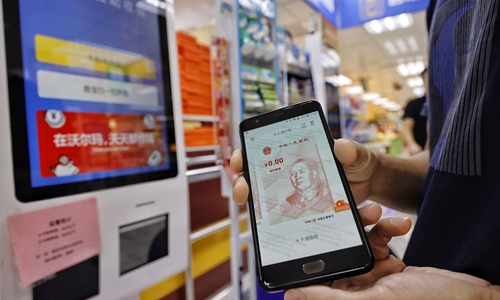
Residents who received "red packets" of digital RMB use the money in stores in Shenzhen, Guangdong Province. The city launched a pilot program to distribute 10m yuan ($1.49m) in the form of digital currency to residents. Photo:Li Hao/GT
A joint venture in Beijing has been created between the Society for Worldwide Interbank Financial Telecommunication (SWIFT), the US dollar-denominated international payments system, and the digital currency research institute and clearing center of China's central bank, sparking speculation over the central bank's pursuit of promoting the global use of its digital currency.
The joint venture, called Financial Gateway Information Service, was established and approved on January 16 with registered capital of 10 million euros ($12 million), according to the National Enterprise Credit Information Publicity System.
The legal representative of the company, registered with the market regulatory management bureau in Beijing's Xicheng district, is a namesake of Eddie Haddad, managing director for the Asia-Pacific region at SWIFT.
SWIFT is the largest of the joint venture's five shareholders in terms of subscribed capital contribution, followed by the clearing center of the People's Bank of China (PBC), the country's central bank.
The remaining shareholders include the PBC's digital currency research institute, the Payment and Clearing Association of China, and CIPS Co, which runs the cross-border interbank payment system under the PBC's supervision and administration.
The new joint venture's business scope includes information system integration, data processing and technical consulting.
The PBC has yet to publicly announce the new joint venture.
"We have been part of China's financial markets for more than 30 years, connecting it to the global financial system by facilitating payments and securities flows across borders, and, as we do everywhere we operate, we make adjustments as necessary to remain compliant with regulatory requirements," SWIFT said in a statement sent to the Global Times on Thursday.
The joint venture could serve as a conduit for broadening the use of the PBC's digital currency, officially called Digital Currency Electronic Payment (DCEP), Cao Yin, managing director of the Shanghai-based Digital Renaissance Foundation, told the Global Times on Thursday.
Thus far, the use of DCEP has undergone trials in some cities, making China a forerunner in the launch of a state-backed digital currency.
In a fresh move to make the digital currency an increasingly viable payment option, the local financial regulatory management bureau in Shenzhen on Thursday unveiled measures to support the development of gold finance in Luohu district, including support for the trial of a digital currency while using gold jewelry consumption coupons.
While the tie-up of SWIFT and the PBC fuels hopes of the use of the DCEP beyond China, Cao noted that the dollar-denominated system for financial messaging and cross-border payments, essentially an American sphere of influence, "couldn't be relied on too much to globalize the DCEP, as a confrontation between China and the US at large is unlikely to see a 180-degree turn any time soon."
Global Times




